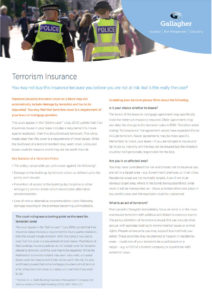You may not buy this insurance because you believe you are not at risk, but is this really the case?
Standard property insurance cover on a block may not automatically include damage by terrorists and has to be requested. You may find that terrorism cover is a requirement of your lease or mortgage provider.
The court appeal in the “Qdime case*” (July 2014) upheld that if an insurance clause in your lease includes a requirement to insure against explosion, then this should include terrorism. The ruling made clear that this cover is a requirement of most leases. While the likelihood of a terrorist incident may seem small, uninsured losses could be massive and it may not be worth the risk.
Key features of a Terrorism Policy
The policy can provide you with cover against the following*:
- Damage to the buildings by terrorist action as defined up to the policy sum insured.
- Prevention of access to the building due to police or other emergency service action which necessitates alternative accommodation.
- Loss of rent or alternative accommodation costs following damage, resulting in the premises becoming uninhabitable.
This court ruling was a turning point on the need for terrorism cover
The court appeal in the “Qdime case*” (July 2014) upheld that if an insurance clause includes a requirement to insure against explosion, then this should include terrorism. With this ruling it now seems clear that this cover is a requirement of most leases. Most blocks of flats buildings insurance policies do not include cover for incidents related to terrorism, and this cover has to be requested. While the likelihood of a terrorist incident may seem very small, uninsured losses could be massive and it may not be worth the risk. It’s also worth being aware that some mortgage providers will not lend on a flat unless terrorism cover is in place, so it can help if you want to sell.
* Qdime Ltd -v- Bath Building (Swindon) Management Company Ltd Various lessees of the Bath Building [2014] UKUT 0261 (LC).
In making your decision please think about the following:
Is it your choice whether to insure?
The terms of the lease or mortgage agreement may specifically state the minimum insurance required. Older agreements may pre-date the change in the terrorism rules in 1990. Therefore when stating “full insurance” the agreement would have expected this to include terrorism. Newer agreements may be more specific. Remember to check your lease—if you are obliged to insure and fail to do so, not only will the loss not be insured but the directors could be held personally responsible for the loss.
Are you in an affected area?
You may have considered the risk and chosen not to insure as you are not in a target area—e.g., Government premises, or inner cities. Residential areas are not normally targets. Even if not in an obvious target area, where is the bomb being assembled, what route it will be transported on—these activities often take place in low profile areas and the explosion could be unplanned.
What is an act of terrorism?
Most people’s thoughts immediately focus on what is in the news and equate terrorism with political acts linked to overseas events. The policy definition of terrorism is broad; this can include other groups with agendas relating to environmental issues or animal rights. People whose aims you may support but methods you abhor. These activities may be planned or happen in residential areas—could one of your residents be a participant or a target—e.g., a CEO of a biotech company or a politician with extremist views.
For Residential Management Committees in small blocks it is normally best for simplicity and costs to extend your block policy to include this cover. If you are managing a large block then a standalone policy from a specialist insurer may save you money.
*As with all insurance policies, the policy is subject to limits, conditions and exclusions. For more information please contact us to discuss further, or request a full summary of the cover or the full policy terms and conditions.
The opinions and views expressed in the above article are those of the author only and are for guidance purposes only. The authors disclaim any liability for reliance upon those opinions and would encourage readers to rely upon more than one source before making a decision based on the information.
FP814-2024e
